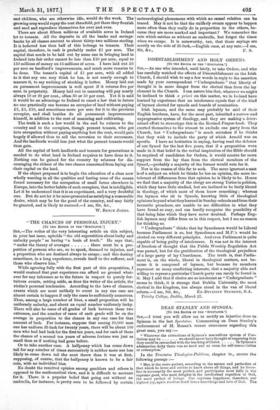" THE CHANCES OF PERSONAL INJURY."
[TO THE EDITOR OF THE "SPECTATOR."] ;SIR,— The writer of the very interesting article on this subject, in your last issue, upholds " the old superstition about lucky and unlucky people " as having " a basis of truth." He says that, "under the theory of averages there must be a pro- portion of persons who are, so to speak, doomed to injuries, and a proportion who are destined always to escape ; and this destiny sometimes, in a long experience, reveals itself to the sufferer, and those who observe him."
While agreeing fully with the first part of this proposition, I would contend that past experience can afford no ground what- ever for any inference as to the future in respect to purely for- tuitous events, setting aside, as does the writer of the article, the victim's personal tendencies. According to the laws of chances, events which are most unlikely to occur in any one case are almost certain to happen if only the cases be sufficiently numerous. Thus, among a large number of lives, a small proportion will be uniformly unlucky, and about an equal number uniformly lucky. There will also be cases of all grades of luck between these two extremes, and the number of cases of each grade will be on the average in proportion to the chance in any one case for that amount of luck. For instance, suppose that among 10,000 men one has uniform ill-luck for twenty years, there will be about 100 men who had bad luck for the first ten years, and for each of these the chance of a second ten years of adverse fortune was just as small then as if nothing had gone before.
Or to take another case. A halfpenny which has come down tail for any.number of times successively is neither more nor less likely to come down tail the next throw than it was at first, supposing, of course, that the halfpenny is known to be a fair -coin, with no individual bias.
No doubt the received opinion among gamblers and others is opposed to the mathematical view, and it is difficult to account for it. There is a popular belief that going out without an umbrella, for instance, is pretty sure to be followed by certain meteorological phenomena with which no causal relation can be traced. May it not be that the unnely events appear to happen more often than they really do in proportion to the others, be- cause they are more marked and important? We remember the rain which catches us without an umbrella, but forget the times when we escape. It is noteworthy, too, that these sayings are mostly on the side of ill-back,—English ones, at any rate.—I am,


































 Previous page
Previous page